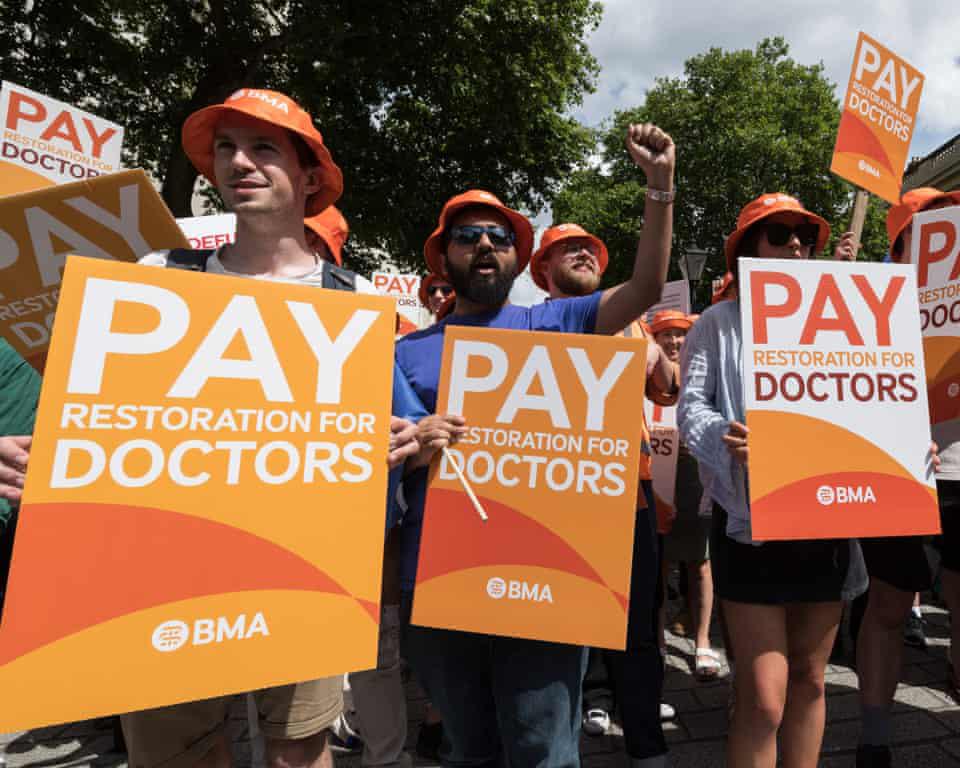Hospitals across England are preparing for fresh strikes by resident doctors, formerly known as junior doctors, who are demanding a 29% pay increase, a move that NHS leaders warn could lead to widespread disruption and the cancellation of hundreds of thousands of appointments and operations.
A ballot of the 55,000 resident doctors represented by the British Medical Association (BMA) closes on Monday, with results expected the following day. NHS officials fear a strong vote in favour of industrial action, potentially triggering six months of rolling strikes that could stretch into January 2026.
The looming dispute comes despite a recent 5.4% pay rise for 2024–25 the largest increase in the public sector this year, awarded by Health Secretary Wes Streeting. It followed a previous 22% pay uplift over two years, which ended a wave of strikes that had seen doctors walk out for a combined 44 days between March 2023 and July 2024.
However, the BMA has described the latest award as derisory and is pushing for a total 29% increase to restore what it claims is a 23% real-terms pay cut since 2008. The union argues this is essential for achieving full pay restoration and retaining doctors in the NHS.
“If members vote yes, they’ll be sending a clear message to the government that pay reform can’t wait,” said Dr Ross Nieuwoudt and Dr Melissa Ryan, co-chairs of the BMA’s resident doctors committee.
Nieuwoudt recently said many members are excited at the prospect of renewed strike action, with frustrations over pay and conditions still running high.
Wes Streeting has urged doctors not to strike again, warning of the damaging impact on patients and the NHS’s recovery. “We can’t afford to return to a continuous cycle of standoffs, strikes, and cancellations,” he wrote earlier this year.
NHS bosses voice out concerns
Hospital bosses and NHS leaders have echoed those concerns. Danny Mortimer, chief executive of NHS Employers, said further walkouts could “likely lead to tens, if not hundreds, of thousands of appointments and operations being cancelled.” While he acknowledged doctors’ frustrations, he warned strikes would have a huge impact on patient care.
Daniel Elkeles, chief executive of NHS Providers, added that prolonged industrial action would divert NHS trusts from their core mission. “Strikes would see hospital leaders spending time managing disruption rather than focusing on improving care.”
The potential return to strikes also casts a shadow over Labour’s flagship NHS pledge to restore the 18-week treatment target by 2029. Critics argue that the goal may be unachievable if widespread disruptions continue.
Rachel Power, chief executive of the Patients Association, said she supported workers’ rights but urged compromise. “With the 10-year health plan aiming to rebuild the NHS and restore public trust, we must ask how this can be achieved amid the risk of continued industrial action,” she said.
The Department of Health and Social Care defended the government’s record, noting resident doctors have seen a 28.9% pay rise over the past three years. “We want to work constructively with all unions to avoid disrupting services for patients,” a spokesperson said.
The spokesperson added that a government review into training and a long-term health plan to cut red tape would help improve working conditions. “We’re committed to reducing bureaucracy and ensuring doctors can focus on what they do best caring for patients.”
Read also: Starmer promises six-day ‘neighbourhood’ NHS service



